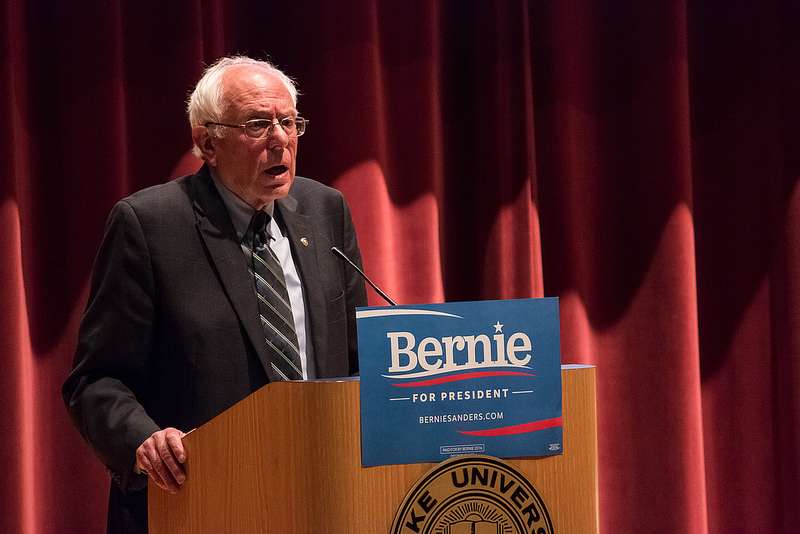What Bernie Sanders Doesn't Understand About Germany's Free College
Why does America have higher attendance and graduation rates?


When a politician says something that indicates a serious fundamental ignorance about economics or crime or really any subject, it can make you wonder whether they truly don't know what they're talking about or whether they're cynically assuming the average voter won't know enough to realize the flaw.
With Sen. Bernie Sanders it can be a toss-up. He recently tweeted a particularly stupid complaint about college loans, whining that there's no reason why their interest rates should be higher than for cars or mortgages. It was pointed out that cars and homes can be repossessed or foreclosed upon, thus reducing the risk from the banks for providing the loan and reducing the potential losses.
Does Sanders even understand this? Who knows? Today the Washington Post has published a commentary from Sanders calling for free college that again highlights his poor grasp of the economics of higher education and avoids any discussion of why college costs are skyrocketing. After crediting the progressive movement with creating the K-12 public education system, he declares: "By 1940, half of all young people were graduating from high school. As of 2013, that number is 81 percent. But that achievement is no longer enough. A college degree is the new high school diploma."
He continues:
In the 1950s and 1960s, it was possible to graduate from high school and move right into a decent-paying job with good benefits. Strong unions offered apprenticeships, and a large manufacturing sector provided opportunities for those without an advanced degree. A couple with a sole breadwinner could buy a home, raise a family and send their kids to college. That was the American dream. Unfortunately, today, for too many Americans, it's not a possibility.
An important pathway to the middle class now runs through higher education, but rising costs are making it harder and harder for ordinary Americans to get the education they want and need. In 1978, it was possible to earn enough money to pay for a year of college tuition just by working a summer job that paid minimum wage. Today, it would take a minimum wage worker an entire year to earn enough to cover the annual in-state tuition at a public university. And that's why so many bright young people don't go to college, don't finish or graduate deeply in debt. With $1.3 trillion in student loans, Americans are carrying more student debt than credit card or auto loan debt. That's a tragedy for our young people and for our nation.
By the way, on what basis is it a tragedy that Americans have more student debt than credit card and auto loan debt? If the argument being presented is that college educations are vital to economic mobility, doesn't that indicate intelligent decision-making?
Anyway, you won't see any discussion in Sanders commentary about why college prices have exploded far above and beyond increases in the consumer price index or even the costs of healthcare. There will be no discussion of how subsidies and administrative bloat have massively driven up prices and eliminated any incentives for colleges to restrain costs. It's just a thing that happened.
Instead, Sanders points to other, smaller countries that have "free" college tuition (scare quotes because obviously somebody's paying for it): Finland, Denmark, Ireland, Iceland, Norway, Sweden, and Mexico. He takes special note of Germany, because even Americans can access their college system:
For a token fee of about $200 per year, an American can earn a degree in math or engineering from one of the premier universities in Europe. Governments in these countries understand what an important investment they are making, not just in the individuals who are able to acquire knowledge and skills but for the societies these students will serve as teachers, architects, scientists, entrepreneurs and more.
Since Sanders left out any analysis of why college is so expensive, it's worth exploring what exactly Sanders has left out when he invokes Germany's college system. Note that Sanders has said "A college degree is the new high school diploma"? That attitude is exactly backwards from how Germany approaches higher education. Germany does not have a work environment that demands a college degree for every well-paying career. The apprenticeship program that Sanders bemoans having lost in America is well intact in Germany. Many careers that require college degrees in America do not require college degrees in Germany.
Even with the free tuition, Germany actually has a lower college enrollment rate than many other Western countries, including the United States (check out World Bank data here). Actually, America has a higher rate of college enrollment than all of the countries Sanders lists except for Finland.
Oh, also: America has a higher college graduation rate than Germany, too. And a greater percentage of young Americans have college degrees compared to every country on Sanders' list except for Norway and Ireland.
Instead, Germany has a very robust vocational education track that partners businesses and the government to provide apprenticeships, so the government (and citizenry) is not paying the full burden for the students' training, though Germany is still covering classroom costs.
It is also a highly regulated, centrally controlled, and very inflexible system that probably won't fly in the United States. Tamar Jacoby noted at The Atlantic when exploring Germany's apprenticeship program a year ago:
What makes dual training work, every manager told us, are the standardized occupational profiles, or curricula, developed by the federal government in collaboration with employers, educators, and union representatives. Every young machinist training anywhere in Germany learns the same skills in the same order on the same timetable as every other machinist. This is good for apprentices: It guarantees high-quality programs where trainees learn more than one company's methods, making it possible for those who wish to switch jobs later on. But it's hard to imagine this level of state control or business-labor cooperation in the U.S.
It's certainly easy to see how a guy who thinks we have too many types of deodorant would not grasp that flexibility and innovation could be lost as a result of standardizing college the way we have public education. It's also possible Sanders wouldn't even grasp that this is a problem.


Show Comments (246)